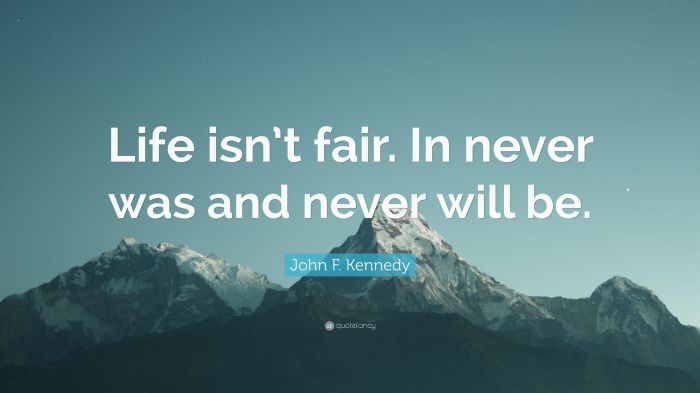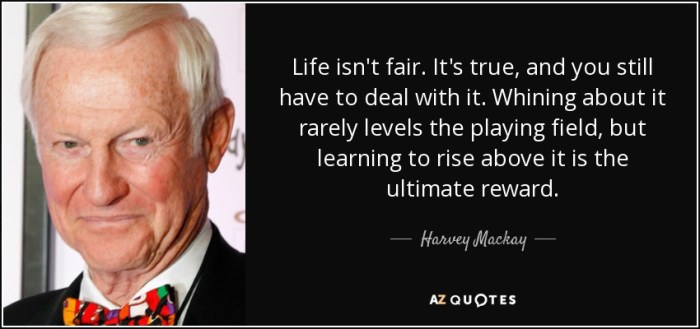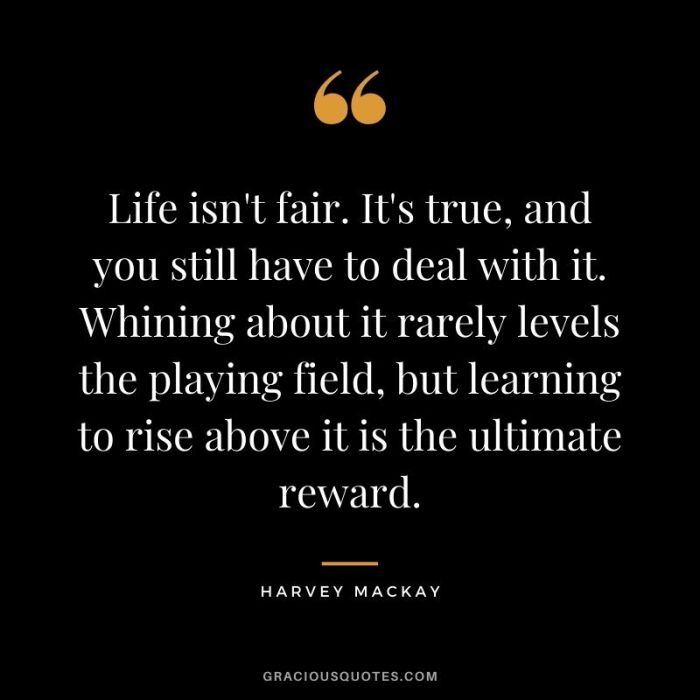Life isn’t fair deal with it answers – Life isn’t fair: deal with it, answers included. This adage encapsulates the harsh reality that life often throws us curveballs, leaving us feeling frustrated, cheated, and questioning the very nature of fairness. But what does it truly mean to “deal with it”? And how can we navigate life’s inherent unfairness with grace, resilience, and a positive outlook?
In this comprehensive guide, we will delve into the multifaceted concept of fairness in life, exploring its philosophical underpinnings, societal implications, and the profound impact it has on our mental well-being. We will provide practical strategies for coping with life’s inevitable challenges, emphasizing the transformative power of perspective and the opportunities for growth and learning that can emerge from adversity.
Life’s Inherent Fairness

The concept of fairness in the context of life is a multifaceted and often debated topic. Philosophers and scholars have contemplated the existence or absence of fairness in life for centuries, with varying perspectives emerging from different schools of thought.
Some argue that life is inherently fair, positing that each individual receives what they deserve based on their actions and choices. This view is often associated with religious or spiritual beliefs that emphasize the principles of karma or divine justice.
Others contend that life is inherently unfair, pointing to the myriad instances of suffering, inequality, and injustice that exist in the world. They argue that factors beyond one’s control, such as birth circumstances, social status, and genetics, can significantly influence outcomes and opportunities.
The reality likely lies somewhere between these two extremes. Life presents both instances of perceived fairness and unfairness, often within the same context. For example, an individual may experience a stroke of good luck in one aspect of their life, such as winning a lottery, while simultaneously facing challenges in another, such as losing a loved one.
Dealing with Life’s Unfairness
Navigating life’s unfair circumstances requires resilience, adaptability, and a proactive approach to coping. Here are some strategies for dealing with life’s unfairness:
- Acknowledge and Validate Emotions:Allow yourself to feel the full range of emotions that arise from unfair situations, without judgment or suppression.
- Seek Support:Surround yourself with supportive individuals who can provide empathy, understanding, and encouragement.
- Reframe Perspective:Challenge negative thoughts and focus on the positive aspects of your life, even in the face of adversity.
- Practice Gratitude:Express appreciation for the good things in your life, no matter how small, to cultivate a sense of balance and positivity.
- Focus on Controllables:Instead of dwelling on circumstances beyond your control, concentrate on aspects of your life that you can influence and improve.
The Role of Perspective

Perspective plays a crucial role in shaping our experiences of fairness. The same situation can be perceived as fair by one individual and unfair by another, depending on their subjective interpretation.
Developing a more positive and balanced perspective can help mitigate the impact of perceived unfairness. Techniques such as:
- Cognitive Reframing:Restructuring negative thoughts into more positive or neutral ones.
- Mindfulness:Paying attention to the present moment without judgment, reducing the tendency to dwell on negative events.
- Cultivating Compassion:Extending empathy and understanding towards others, fostering a sense of interconnectedness.
The Impact on Mental Health

Perceived unfairness can have a significant impact on mental health. Studies have linked unfairness to conditions such as:
- Anxiety:Feelings of uncertainty, worry, and fear can arise from perceived unfairness.
- Depression:Unfairness can lead to feelings of hopelessness, helplessness, and low self-worth.
- Low Self-Esteem:Unfair treatment can erode self-confidence and lead to negative self-perceptions.
Seeking support from mental health professionals, practicing self-care techniques, and developing coping mechanisms are essential for managing the mental health challenges associated with perceived unfairness.
Growth and Learning: Life Isn’t Fair Deal With It Answers

Life’s unfairness can serve as a catalyst for personal growth and learning. Adversity can foster:
- Resilience:Overcoming challenges can strengthen resilience and equip individuals with coping skills for future setbacks.
- Adaptability:Navigating unfair circumstances requires adaptability and the ability to adjust to changing situations.
- Self-Discovery:Adversity can provide opportunities for self-reflection and the discovery of hidden strengths and abilities.
Embracing the growth mindset and seeking opportunities for learning and self-improvement can transform unfair experiences into sources of personal development.
Societal Implications
Perceived unfairness can have broader societal implications, including:
- Social Unrest:Unfair treatment and perceived injustices can fuel social unrest and protests.
- Inequality:Unfairness can perpetuate and exacerbate social and economic inequalities.
- Injustice:Unfair practices and systems can undermine the rule of law and lead to injustice.
Addressing societal unfairness requires collective action, policy changes, and a commitment to promoting equity and justice for all.
Question Bank
What is the concept of fairness in the context of life?
Fairness in life refers to the perceived or actual distribution of resources, opportunities, and outcomes among individuals or groups. It encompasses notions of justice, equity, and impartiality.
How can we cope with life’s unfair circumstances?
Coping with life’s unfairness requires resilience, adaptability, and a positive mindset. Focus on what you can control, practice gratitude, seek support from loved ones, and engage in activities that bring you joy.
How does perspective play a role in our experiences of fairness?
Perspective shapes how we interpret and respond to life’s events. Cultivating a more positive and balanced perspective can help us see challenges as opportunities for growth and learning.
What are the potential mental health consequences of perceived unfairness?
Perceived unfairness can contribute to anxiety, depression, low self-esteem, and feelings of hopelessness. It is important to seek professional help if you are struggling with these issues.
How can life’s unfairness serve as a catalyst for personal growth?
Adversity can foster resilience, self-discovery, and a deeper appreciation for life. By embracing challenges and learning from our experiences, we can emerge from them stronger and wiser.